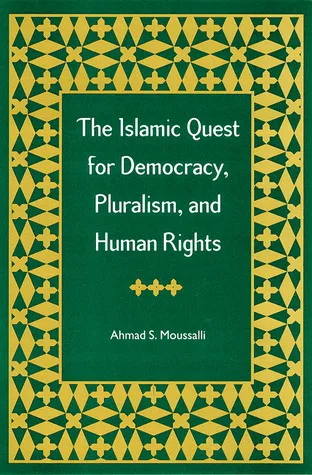The Islamic Quest for Democracy, Pluralism, and Human Rights
By (author): "Ahmad S. Moussalli"

ISBN0813026490
ISBN139780813026497
AsinThe Islamic Quest for Democracy, Pluralism, and Human Rights
Original titleThe Islamic Quest for Democracy, Pluralism, and Human Rights
"Required reading for Middle East specialists, policy persons, and students. It is the accurate, empathetic, and largely untold internal story of Islam and democracy in the contemporary era." --Louis J. Cantori, University of Maryland"Stands alone among the numerous books that have dealt with the familiar theme of politics and religion in the Muslim world. . . . All students of the present-day Muslim world, from academics to policy mavens to the general public, should be attracted to the arguments, and also the evidence, of this tightly constructed book." --Bruce Lawrence, Duke University "This is the slyest, and therefore smartest, assessment of Islamic fundamentalism currently available. The scholarship is as rigorous as the thesis is original. Moussalli has advanced all his arguments on the basis of primary documents from Arabic. Pioneering work. It is subtle analysis of a very complex topic."--International Journal of Middle East Studies"This book, read in the aftermath of the events of September 2001, is a must read for anyone seeking to understand how things reached the point they have with reference to the various relationships existing within Islam and between the West and Islam, Modernity and Islam, Radicalism and Islam, Fundamentalism and Islam, Muslim Moderates, who they are and who they aren’t, and who and what are the contending forces in the Muslim world."--International Journal on World PeaceWith Islamic fundamentalism on the rise, Western scholars, politicians, and media often question the underlying compatibility of Islam--especially in its modern interpretations as related to the quest for an Islamic state--with democracy, individual liberty, civil society, and limited government. Ahmad Moussalli demonstrates that the opposition between Islam and democracy is more illusory than real. He offers as evidence the striking variety in Islamic thought that has been largely overlooked in contemporary scholarly and public policy debate.Reviewing Islamic texts and writings from some of the most important Islamic thinkers, Moussalli summarizes classical theory as developed not by the philosophically important thinkers such as Ibn Rushd and al-Farabi but rather by al-Marwardi and others. He shows that the theoretical foundations of limited government, civil society, and individual liberty have been developed by Muslim philosophers, jurists, and theologians independently of Islamic regimes. Moving to more contemporary thinkers, he demonstrates that al-Banna, al-Turabi, al-Ghanoushi, and others--some with controversial political positions--are in fact intellectual moderates on the subject of democracy, human rights, and pluralism. Moussalli explains that Muslims have long debated the problematic relationships between political priority on the one hand and society and the individual on the other. In telling the story of the Islamic quest for democracy, he also tells the story of contemporary Islamic political theory, revealing the internal political discourse of contemporary Islam in an empathetic, critical, but sympathetic fashion. His account leaves no doubt, contrary to many views in the media, public policy, and scholarly worlds, that democracy is intrinsic to contemporary Islamic discourse. Ahmad S. Moussalli is associate professor of political science at the American University of Beirut.